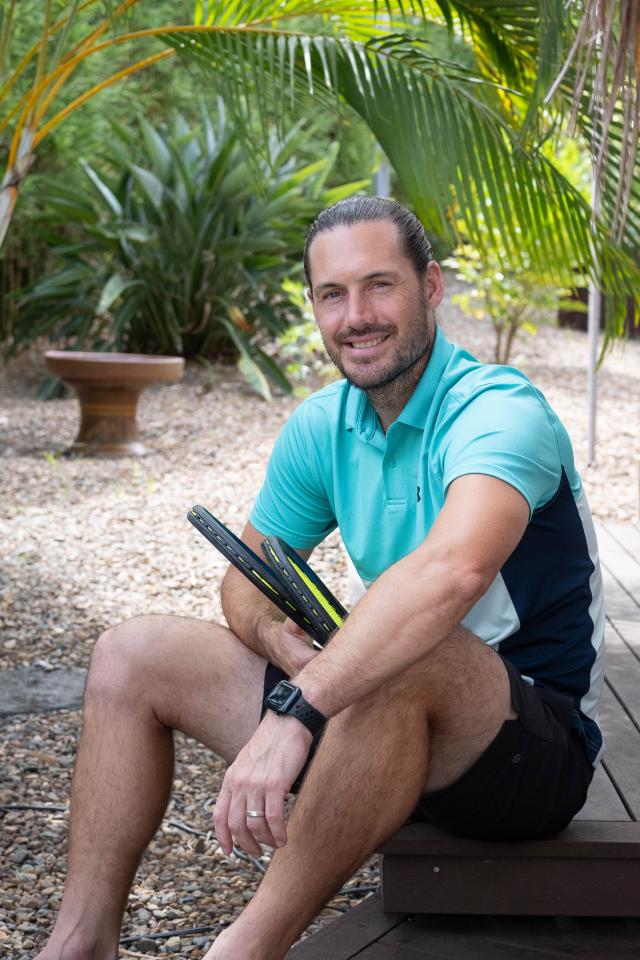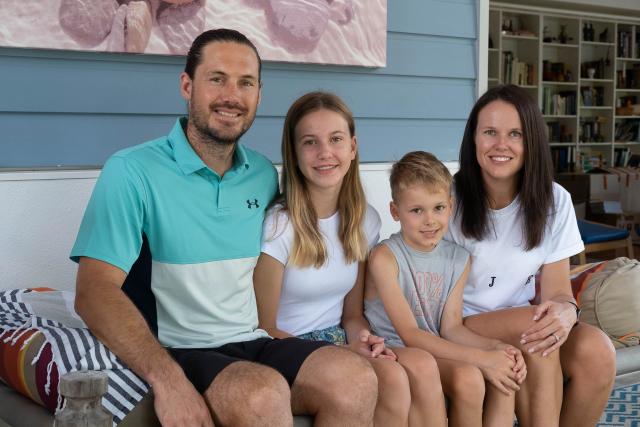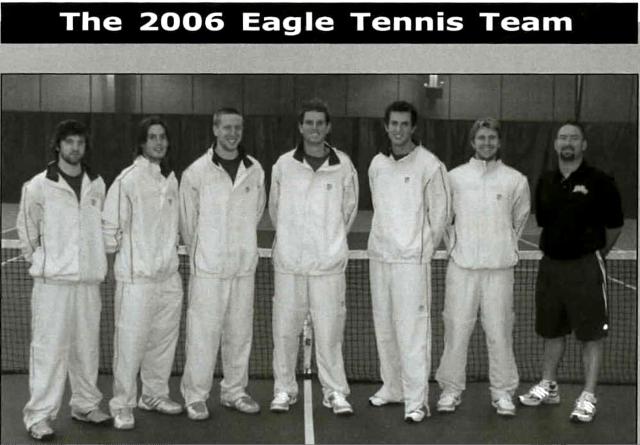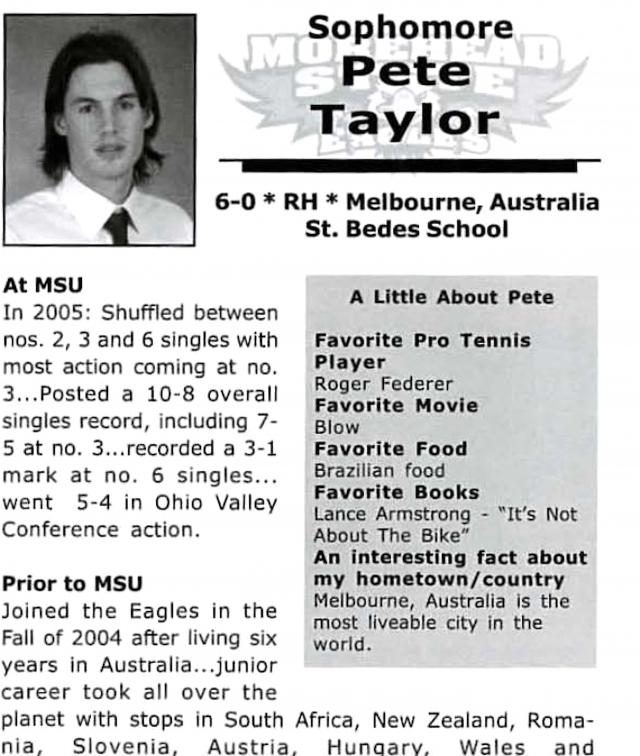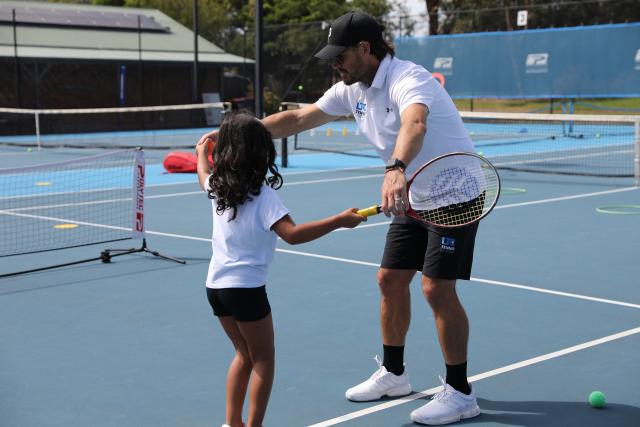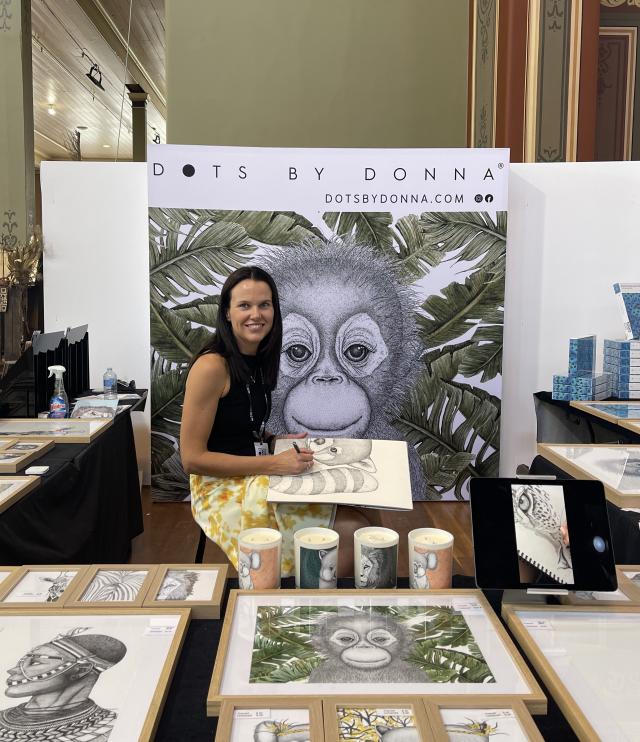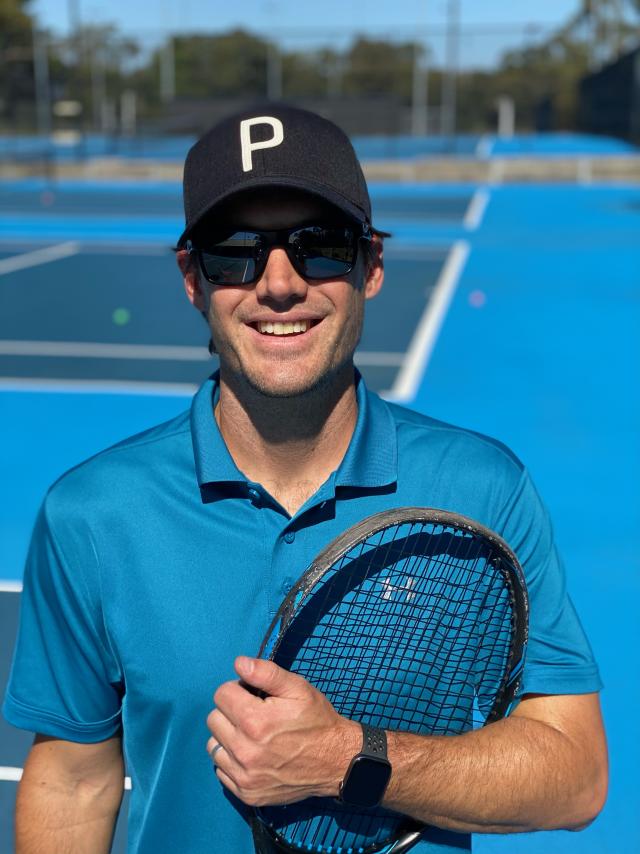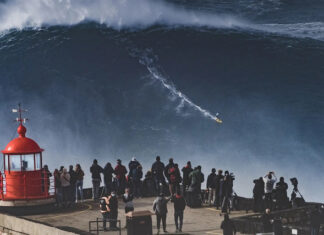Locked down in Melbourne in 2020 and unable to work, successful tennis coach and former pro Pete Taylor and his young family decided to hit the road.
Getting out of Victoria wasn’t particularly easy at that time, but after a police grilling at Tullamarine, Pete, wife Donna and children Milla, 12, and Leo, seven, boarded a flight to Darwin where they settled into 14 days’ quarantine at Howard Springs, beginning a grand touring adventure through the Outback that would eventually lead them to Noosa.
Pete had been to Noosa with his parents as a kid, but for the others it was a discovery.
“We all just fell in love with it,” he said.
“When we eventually got back to Melbourne we started talking about moving to Noosa. It was kind of a joke at first, but it kept coming back into the conversation.” Donna, who had quit a high-flying job in retail management to spend more time with the kids, and had accidentally morphed into a very successful artist, could work anywhere.
Pete was the one holding them back, committed to his position as head coach of Langwarrin Tennis Club, a highly-rated, nine-court facility in outer Melbourne, and at the peak of his powers after 14 years of top-level coaching.
But then, one day late last year he heard about a job going at the Tewantin Tennis Club. A little light flashed on in his brain. This was their chance.
Born in South Africa, Pete Taylor migrated to New Zealand with his parents in 1995, where his dad helped establish successful dairy farms.
Soon his success led to job offers in the region, and the family chose Australia over Indonesia, settling in Melbourne. Before he turned 12 he’d lived in South Africa, New Zealand and Australia.
At his primary school in New Zealand, students were given a choice to do a full day of school or play in a tennis tournament.
“So naturally I chose tennis and we made the final in the doubles and I was hooked,” he recalls.
But cricket remained his number one sport in Melbourne, and by the time he was 14 he was playing senior grade.
“The problem with that was I was playing with guys in their 20s or older, so I’d always get put way out on the boundary to field, and it was lonely out there. I’d usually do well with the bat but for me there was no social aspect to it.
“In tennis I was hitting every second ball and people would talk to me. Better value all round.”
After a successful stint in the junior ranks (reaching top five in Victoria and top 20 in Australian under-16s), the bank of mum and dad helped fund Pete’s foray into the world of professional tennis’s touring pros after his graduation from high school.
With the sports media fixated on the Djokovics, Federers, Nadals and Bartys, you don’t hear much about the thousands of aspiring pros who travel a world of pain playing low level tournaments in forgotten cities for chump change (or nothing) as they take one step forward and three backwards on the rickety rankings ladder.
In tennis they’re known, perhaps a little cruelly, as journeymen, but as in most professional sport, the grind of the qualifying tour sometimes reveals the true spirit and the real heroes of the game.
And, as a former tennis pro once told me: “If you rank top 200, you’re a bloody brilliant player.”
Pete Taylor ranked top 10 in New Zealand and top 65 in Australia in his pro career. If this qualifies him as a journeyman, then it’s a badge he wears with pride. He recalls: “I spent close to a year trying to be a pro, playing pro tournaments only. As an 18-year-old travelling to all these Eastern European countries (like Slovenia, Hungary, and Romania), I was just trying to survive rather than trying to win.
“I didn’t travel with a coach, no helpers, just me and a mate doing the same thing. It was really backs-to-the-wall, just trying to survive week in, week out. You get a payday if you make the main tournament, but I was still playing qualifying rounds.
“The mate made it as a tour pro, I went a different route, but I think we were both happy with the experience and the outcome.
“It becomes pretty clear after a while if you’re going to have to battle, and it affects different players in different ways. If you don’t have the belief that you can beat people, you fizzle out pretty quickly. Then there’s the journeymen – they might not have the results but mentally it doesn’t bother them.”
Fortunately, Pete had a Plan B in the form of a bunch of offers of tennis scholarships from American universities. Knowing next to nothing about the US college system, he passed over some of the majors and chose Morehead State in the pretty mountains of East Kentucky’s bible belt, where five Aussie mates from juniors days dominated the tennis team.
He says: “On the academic level, it was like doing Year 11 at school. If you turned up for class you got a pass. One time I failed, so I wrote to the teacher and said I was on a sports scholarship and I needed a B to keep playing on the tennis team.
“He wrote back: ‘Done.’ The other Aussies told me when I got to Kentucky, introduce yourself to the teacher, shake his hand and give him a jar of Vegemite and you’re set! On the tennis level the competition was pretty tough though, these guys could all play.”
Asked to nominate the highlights of his playing career, interestingly Pete chooses a moment in his three years of college, studying for a commerce degree, rather than the pro tour.
“I think I played my best tennis in my first tournament. Mentally I got in my own way sometimes, but back then I was beating people I probably wouldn’t have if I’d known who they were, and that got me a few good wildcards in doubles. But I probably had more career highlights in college tennis.
“One I remember is we were playing Tennessee Tech and our school had never beaten them. It was three matches each and the decider was the doubles. I had this shot on the net and instead of hitting a normal volley, I put a huge backhand swing on it. The stand was full of people in our colours and they were all going mental.
“My shot hit their guy in the back and our people were cheering and the other side had really cracked it. Then it was match point and the guy served to me and I hit back a clean winner. All these people charged onto the court cheering. That’s my best memory of my playing days.”
After finishing his degree and college tennis career at Texas Pan American University, Pete returned to Melbourne where he fell in love with Donna and became an elite coach, mainly working with touring players like Marinko Matosevic, who made it to a 39 ATP ranking.
“But if you work with those guys, you get no help from Tennis Australia.
“If you say you’re going to a primary school and you want some equipment, they’ll say how much do you need?
“So I was leaning a bit that way, and after Donna and I married and had kids, I realised I couldn’t be touring with the players all the time so I started looking at a club coach role where I could work with kids.”
Over 16 years from 2006, Pete developed into one of Melbourne’s leading head coaches, masterminding elite and children’s programs at three major tennis clubs, while growing their member bases exponentially.
Looking at this background, combined with the Taylor family’s absolute passion to become part of the Noosa community, the Tewantin Tennis Club had no problems in accepting Pete’s application.
He says: “You could teach a five-year-old a basic top spin in 15 minutes, but it’s not about easy results. The philosophy now is to teach them how to play like the pros from the start, taking a five-year-old and building their skills so that by about 11 they can play club comp.
“It’s about real coaching from the start, not babysitting. That’s the style of coaching I’m bringing to Tewantin. It’s a great club in a great position in terms of finances and membership, but I believe I can add a new element at junior level, and that’s something we can work on from primary school level.
“The other hurdle is getting them from juniors to seniors. If you can nail that, the club booms.”
The Taylors sold their Melbourne home in four days, moved up and settled in Noosa last month.
Pete conducted his first open day at the club last weekend and is well underway with his programs, while Donna is re-establishing her successful Dots By Donna animal prints business here. She says Pete came home from coaching one day and “busted me doing my art”.
He says: “I didn’t even know she could draw!”
Donna made $500 at her first market stall, got 88 orders off her first social media post and a couple of years later won a major international best product award at the New York Now show.
Yeah, she can draw, and he can coach.

